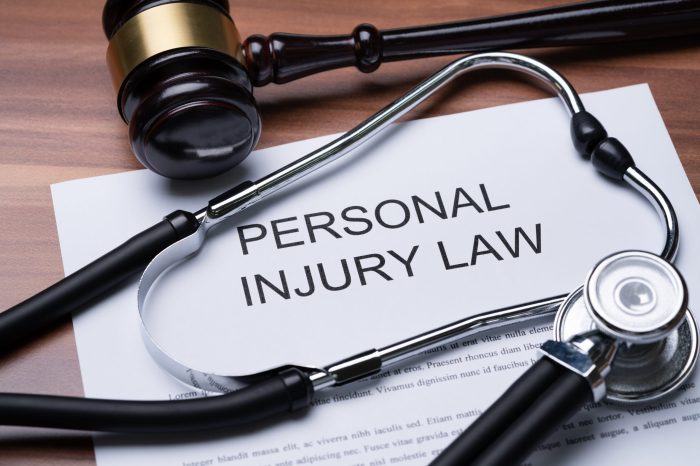Personal injury legal representation stands as a beacon of hope for victims of accidents and injuries, guiding them through the complexities of the legal system to seek justice and fair compensation. This comprehensive guide delves into the intricacies of personal injury law, empowering you with knowledge and strategies to protect your rights.
Understanding the types of personal injury cases, selecting the right lawyer, and navigating the legal process are crucial steps in maximizing your recovery. We will explore the ethical considerations and responsibilities of personal injury lawyers, ensuring that your case is handled with integrity and confidentiality.
Personal Injury Legal Representation

Personal injury legal representation refers to the legal assistance provided to individuals who have suffered physical, emotional, or psychological harm due to the negligence or intentional acts of another party.
Seeking legal assistance after an injury is crucial to protect your rights, ensure fair compensation, and navigate the complex legal system.
Types of Personal Injury Cases
Personal injury cases encompass a wide range of incidents that result in harm to an individual. Common types include:
- Car accidents
- Slip and fall accidents
- Medical malpractice
- Product liability
- Wrongful death
The legal basis for each type of case varies depending on the specific circumstances and the applicable laws.
If you’ve been injured in a car accident, it’s important to seek legal representation as soon as possible. A personal injury lawyer can help you understand your legal rights and options, and can fight to get you the compensation you deserve.
In many cases, car accidents are caused by the negligence of another driver. If you believe that you were injured in a car accident due to the fault of another driver, it’s important to speak to a personal injury lawyer about your legal options.
You may be entitled to compensation for your medical expenses, lost wages, and pain and suffering. Legal responsibility car accidents vary from state to state, so it’s important to speak to a lawyer in your state to learn more about your rights.
Choosing a Personal Injury Lawyer
Selecting the right personal injury lawyer is essential for maximizing your chances of success. Consider the following qualities:
- Experience in handling personal injury cases
- Proven track record of success
- Strong negotiation and litigation skills
- Compassion and understanding
- Transparency and communication skills
The process of selecting and hiring a lawyer involves scheduling consultations, reviewing their credentials, and discussing fees and payment options.
The Personal Injury Legal Process: Personal Injury Legal Representation
A personal injury case typically involves the following steps:
- Initial consultation and investigation
- Demand letter and negotiations
- Filing a lawsuit (if necessary)
- Discovery and evidence gathering
- Trial or settlement
The lawyer plays a crucial role throughout the process, providing legal guidance, representing you in negotiations and court proceedings, and advocating for your best interests.
Personal injury legal representation is a critical element in ensuring that victims of accidents receive fair compensation. Whether it’s a car crash , slip and fall, or medical malpractice, having an experienced legal advocate can make a significant difference in the outcome of your case.
They will navigate the complexities of the legal system, negotiate with insurance companies, and fight for your rights to ensure that you receive the compensation you deserve.
Damages in Personal Injury Cases
In personal injury cases, damages refer to the compensation awarded to the victim for the harm suffered. Types of damages include:
- Medical expenses
- Lost wages
- Pain and suffering
- Emotional distress
- Loss of enjoyment of life
Damages are calculated based on various factors, including the severity of the injury, the impact on the victim’s life, and the defendant’s liability.
When faced with the aftermath of an accident, seeking legal representation is crucial for safeguarding your rights. Personal injury legal representation provides expert guidance and support, ensuring you receive fair compensation for damages incurred.
Car accidents, a prevalent type of personal injury case, often require specialized legal assistance.
For comprehensive guidance and legal support in navigating the complexities of car accident claims, consider seeking car accident legal help. Personal injury legal representation empowers you to pursue justice and protect your interests after an accident.
Settlement and Trial
Settlement negotiations are an attempt to resolve the case without going to trial. If negotiations fail, the case may proceed to trial, where a judge or jury will determine liability and damages.
Factors that may lead to a trial include:
- Disagreements over liability
- Unreasonable settlement offers
- Complex legal issues
Ethical Considerations
Personal injury lawyers have ethical responsibilities, including:
- Maintaining client confidentiality
- Acting in the best interests of the client
- Avoiding conflicts of interest
- Charging reasonable fees
Adhering to these ethical guidelines ensures the integrity of the legal system and protects the rights of clients.
Final Review
Whether you are seeking compensation for medical expenses, lost wages, or pain and suffering, personal injury legal representation provides a lifeline to justice.
By arming yourself with the information presented in this guide, you can confidently pursue your claim and secure the compensation you deserve.
Expert Answers
What is the role of a personal injury lawyer?
A personal injury lawyer represents victims of accidents and injuries, helping them navigate the legal system to seek compensation for their losses.
How do I choose the right personal injury lawyer?
Look for a lawyer with experience in handling personal injury cases, a strong track record of success, and a reputation for integrity and client care.
What types of damages can I recover in a personal injury case?
Damages may include compensation for medical expenses, lost wages, pain and suffering, and other losses related to the injury.




